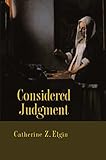Considered Judgment / Catherine Z. Elgin.
Material type: TextPublisher: Princeton, NJ : Princeton University Press, [1999]Copyright date: ©1996Edition: Course BookDescription: 1 online resource (240 p.)Content type:
TextPublisher: Princeton, NJ : Princeton University Press, [1999]Copyright date: ©1996Edition: Course BookDescription: 1 online resource (240 p.)Content type: - 9780691005232
- 9781400822294
- 121
- BD161 .E44 2001
- online - DeGruyter
- Issued also in print.
| Item type | Current library | Call number | URL | Status | Notes | Barcode | |
|---|---|---|---|---|---|---|---|
 eBook
eBook
|
Biblioteca "Angelicum" Pont. Univ. S.Tommaso d'Aquino Nuvola online | online - DeGruyter (Browse shelf(Opens below)) | Online access | Not for loan (Accesso limitato) | Accesso per gli utenti autorizzati / Access for authorized users | (dgr)9781400822294 |
Browsing Biblioteca "Angelicum" Pont. Univ. S.Tommaso d'Aquino shelves, Shelving location: Nuvola online Close shelf browser (Hides shelf browser)

|

|

|

|

|

|

|
||
| online - DeGruyter Dissolution : The Crisis of Communism and the End of East Germany / | online - DeGruyter Socializing Capital : The Rise of the Large Industrial Corporation in America / | online - DeGruyter Gatekeepers of Growth : The International Political Economy of Central Banking in Developing Countries / | online - DeGruyter Considered Judgment / | online - DeGruyter The Complexity of Cooperation : Agent-Based Models of Competition and Collaboration / | online - DeGruyter Bodies of Law / | online - DeGruyter Philosophy in a Feminist Voice : Critiques and Reconstructions / |
Frontmatter -- CONTENTS -- PREFACE -- CHAPTER I. Epistemology's End -- CHAPTER II. The Failure of Foundationalism -- CHAPTER III. Knowledge by Consensus -- CHAPTER IV. The Merits of Equilibrium -- CHAPTER V. The Heart Has Its Reasons -- CHAPTER VI. Shifting Focus -- CHAPTER VII. Epistemic Interdependence -- INDEX
restricted access online access with authorization star
http://purl.org/coar/access_right/c_16ec
Philosophy long sought to set knowledge on a firm foundation, through derivation of indubitable truths by infallible rules. For want of such truths and rules, the enterprise foundered. Nevertheless, foundationalism's heirs continue their forbears' quest, seeking security against epistemic misfortune, while their detractors typically espouse unbridled coherentism or facile relativism. Maintaining that neither stance is tenable, Catherine Elgin devises a via media between the absolute and the arbitrary, reconceiving the nature, goals, and methods of epistemology. In Considered Judgment, she argues for a reconception that takes reflective equilibrium as the standard of rational acceptability. A system of thought is in reflective equilibrium when its components are reasonable in light of one another, and the account they comprise is reasonable in light of our antecedent convictions about the subject it concerns. Many epistemologists now concede that certainty is a chimerical goal. But they continue to accept the traditional conception of epistemology's problematic. Elgin suggests that in abandoning the quest for certainty we gain opportunities for a broader epistemological purview--one that comprehends the arts and does justice to the sciences. She contends that metaphor, fiction, emotion, and exemplification often advance understanding in science as well as in art. The range of epistemology is broader and more variegated than is usually recognized. Tenable systems of thought are neither absolute nor arbitrary. Although they afford no guarantees, they are good in the way of belief.
Issued also in print.
Mode of access: Internet via World Wide Web.
In English.
Description based on online resource; title from PDF title page (publisher's Web site, viewed 30. Aug 2021)


